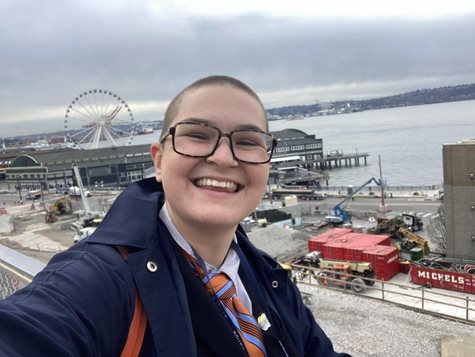December 2020
Personally, I have never had one role model. Sure, I love my family and think Sarah Paulson is a fantastic actress, but there has never been one person out there in the ether who I model my entire life on. I think it is my individualist streak combined with the romantic view I hold of my own life that causes me to not cling to one person. Instead, I have multiple role models for multiple different things, each of which I have encountered sometime in the course of my life. My high school calculus teacher will always be the one I look up to when it comes to loving deeply, my organizational advisors are the ones that I think of when I consider how to be a strong woman, and my parents taught me the value of working hard for what you want.
These role models I have found throughout my life have directly contributed to my growth in a myriad of ways. I would not be who I am without them and I am thankful for each and every one of them.
Although I have been able to recognize the everyday role models in my life, one thing I had never considered was myself becoming a role model. Being a twenty-three-year-old graduate student in a college town puts me on the older end of the spectrum, and thus much of my time is spent working with folks that are younger than me. The other day during one such meeting with my slightly younger peers, a meeting that I was leading, I said something rather self-deprecating about a graphic I had made. Anyone who knows me would tell you this is not surprising—self-deprecating humor is something I use a lot because of my constant worry that the work I am doing is not good enough or that, if I do not joke about my success, I will come off as cold. But in this particular situation, someone I was working with called me out. He told me that I should not hate on my work because it was an awesome start, and everyone in the group was grateful I had provided structure and an example for them to work with.
I am still not sure why this interaction struck me so much. Maybe it was because I had a bad day and needed support, or maybe it was because I realized after the meeting that I was six years his senior, but regardless, I have held onto this comment ever since. It made me want to be better, because what I do and say is being watched (and possibly even used as an example to look up to) by someone else. As a teacher and student leader, I interact with a lot of people in my week who may be looking at me as the model of what to do.
I know this because I do it in my own life. There are three people in particular who/m I have worked with this semester alone whose words echo in my head long after they say them. I look to them when thinking of how to be professional, hopeful, balanced, and kind. And there is one trait each of them has in common: they are secure in who they are. They are not boastful, not by any stretch, but each of them acknowledges their strengths and weaknesses with dignity, grace, and humility. They never say anything self-deprecating because they recognize the value of their work and are secure in the idea that they are doing their best each and every day. Now this, this is a quality to look up to. This is what I want to emulate. I don’t want my students or younger peers looking to me and learning that the way to succeed in graduate school is by undervaluing your work. I don’t want them thinking that low confidence and martyrdom are the defining factors of great leaders, and I do want them to see me as a great leader.
It is important that we, as graduate students, big sisters and brothers, roommates, friends, coworkers, teachers, and mentors, all treat ourselves and present ourselves in the ways we want younger generations to imitate. We have the power to shape the future through our kindness and our guidance, but it is up to us to ensure that we do not fall into the trap of being too boastful or too humble, instead acknowledging our success and failures with equal weight and dignity. After all, you never know who is watching.
-Delaney Couri
Delaney is a master’s student in the Department of Teaching, Learning, and Culture
